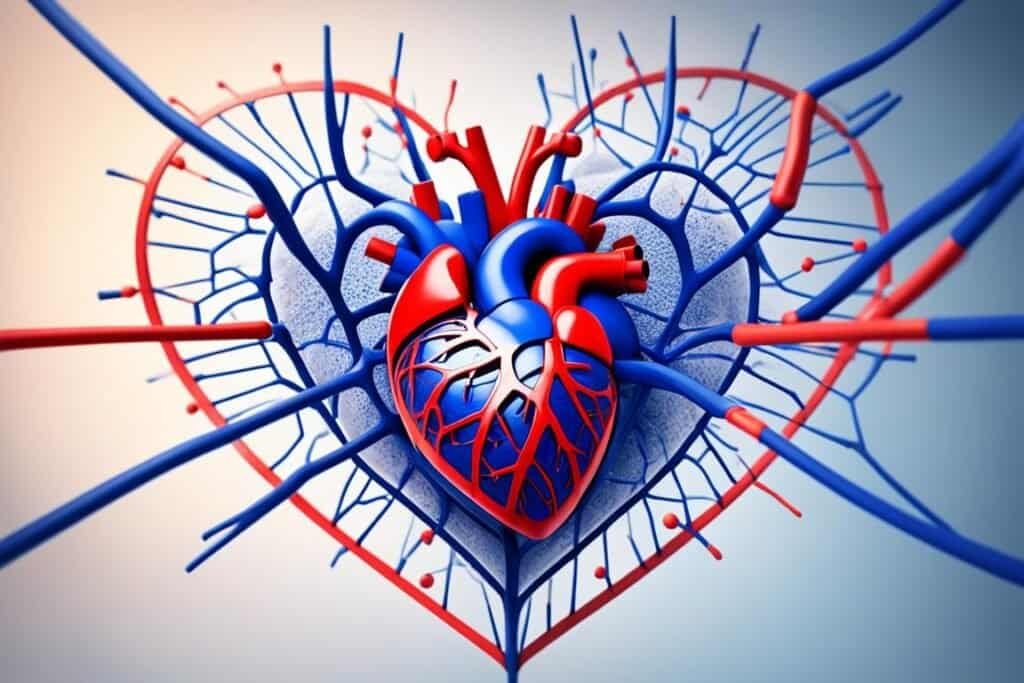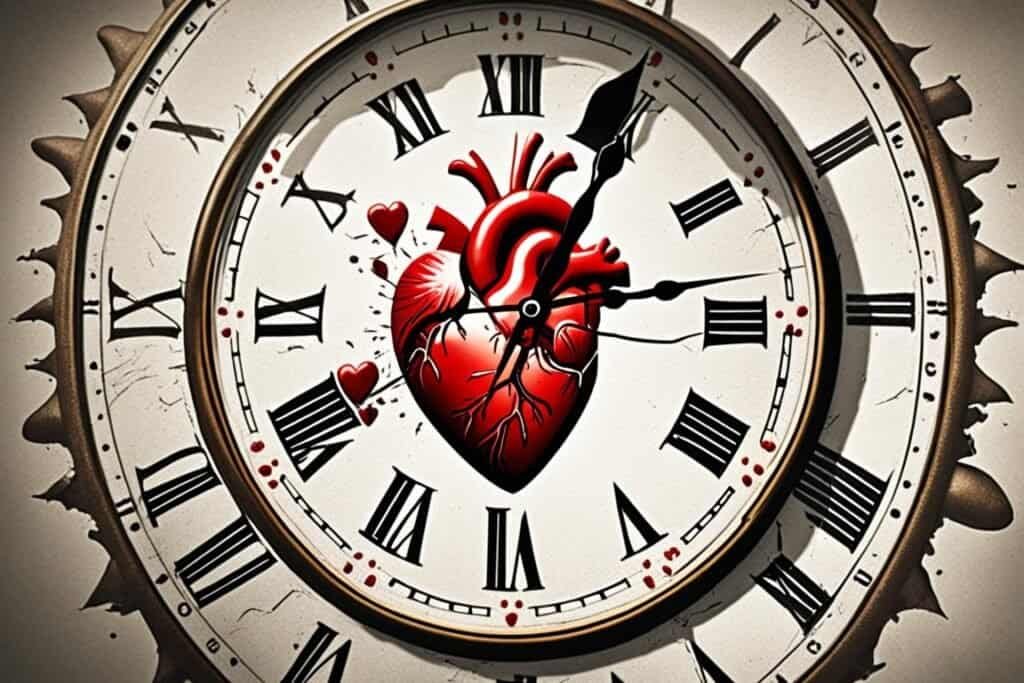Did you know that heart attacks are more common in the morning? It may seem surprising, but there are several factors that contribute to this increased risk. Understanding why heart attacks are more prevalent in the morning can help you take the necessary precautions to protect your heart health.
One of the main reasons for the higher incidence of heart attacks in the morning is the body’s natural rhythm and hormone levels. Stress hormones, such as cortisol, are at their highest levels in the morning. These hormones can contribute to the development of heart attacks during this time.
Contrary to popular belief, the increased risk of morning heart attacks is not due to sleep apnea or midnight snacking. Instead, it is a combination of hormonal fluctuations and other factors that make morning hours a critical time for heart health.
Key Takeaways:
- The risk of heart attacks is higher in the morning, particularly between three and four in the morning.
- Stress hormones, such as cortisol, are at their peak in the morning and may contribute to the increased risk of heart attacks.
- Understanding the risk factors associated with morning heart attacks can help you take preventive measures to protect your heart health.
- Recognizing the atypical symptoms of a heart attack in the morning is crucial for early detection and better outcomes.
- Prompt medical attention and following a treatment plan are vital for minimizing damage and improving heart attack survival rates.
Heart Disease in Women
Heart disease is a major concern for women in the United States, being the leading cause of death. While heart attacks are commonly associated with coronary artery disease, it’s important to note that women may face different risk factors and outcomes compared to men.
On average, women experience their first heart attack at the age of 72, which is older than the average age for men. However, there has been a concerning rise in heart attacks among women under the age of 40 in recent years. This trend may be attributed to lifestyle changes, including sedentary behavior and poor diet.
Finding effective ways to combat heart disease in women is crucial for improving overall health and well-being. By understanding the unique risk factors and adopting healthy habits, women can reduce their chances of experiencing a heart attack.
Let’s take a closer look at the statistics and risk factors for heart disease in women:
| Risk Factors | Statistics |
|---|---|
| High blood pressure | More than 40% of women over the age of 20 have high blood pressure. |
| High cholesterol levels | More than 50% of women aged 45 and older have high cholesterol levels. |
| Smoking | Smoking increases the risk of heart disease in women by 25%. |
| Diabetes | Women with diabetes have a two to four times higher risk of heart disease. |
| Obesity | Approximately 40% of women in the United States are obese, increasing their risk of heart disease. |
As you can see, there are several risk factors that contribute to heart disease in women. Taking proactive steps to address these factors, such as maintaining a healthy weight, quitting smoking, managing blood pressure and cholesterol levels, and controlling diabetes, can greatly reduce the risk of heart attacks.
It’s important for women to be aware of the specific signs and symptoms of a heart attack, as they may differ from the classic chest pain experienced by men. The atypical symptoms can include shortness of breath, jaw pain, indigestion, and anxiety.
By understanding the unique risks and making lifestyle changes, women can protect their heart health and reduce the likelihood of heart disease and heart attacks.
The Role of Hormones and Cortisol
When it comes to morning heart attacks, hormones, particularly cortisol, play a significant role. Cortisol is a stress hormone that helps wake the body up and get it moving in the morning. Elevated cortisol levels in the morning, released as part of the body’s natural circadian rhythm, have been theorized to contribute to the increased risk of heart attacks during this time.
In addition to cortisol, another protein called PA1, found in higher levels in the morning, may also contribute to the risk of blood clots, which can lead to heart attacks. These elevated hormone and protein levels during the morning hours can potentially disrupt the delicate balance of the cardiovascular system and increase the likelihood of heart attack.

Although the exact mechanisms linking cortisol and PA1 to heart attack risk are still being studied, it is believed that the stress response triggered by cortisol and the effects of PA1 on blood clot formation could be contributing factors.
Understanding the influence of hormones and cortisol on heart attack risk during the morning hours is essential for identifying strategies to reduce this risk. By managing stress levels, adopting healthy lifestyle habits, and seeking regular medical check-ups, individuals can work towards lowering their risk of morning heart attacks.
| Hormones and Heart Attack Risk | Cortisol Levels in the Morning |
|---|---|
| Elevated cortisol levels may contribute to increased risk of heart attacks during the morning hours. | Cortisol is released as part of the body’s natural circadian rhythm, with higher levels in the morning. |
| The protein PA1, found in higher levels in the morning, may also contribute to the risk of blood clots. | PA1 levels during the morning hours could potentially disrupt the cardiovascular system. |
| Stress response triggered by cortisol and effects of PA1 on blood clot formation are believed to be contributing factors in heart attack risk. | Research is ongoing to fully understand the mechanisms linking cortisol and PA1 to heart attack risk. |
Morning Heart Attack Symptoms
Morning heart attacks may present with symptoms that differ from the typical signs associated with heart attacks. This is especially true for women, who may experience atypical symptoms rather than the classic chest pain that is often associated with heart attacks.
Common morning heart attack symptoms include:
- Shortness of breath
- Jaw pain
- Indigestion
- Anxiety
These atypical symptoms can make it more challenging to recognize a heart attack in the morning, particularly when individuals may still be groggy from sleep. It is crucial to be aware of and recognize these symptoms to ensure prompt medical attention and reduce the risk of severe complications.
| Symptom | Description |
|---|---|
| Shortness of breath | Feeling breathless and having difficulty breathing normally |
| Jaw pain | Discomfort or pain in the jaw, often radiating from the chest |
| Indigestion | Feeling of discomfort or burning sensation in the upper abdomen, often mistaken for indigestion or heartburn |
| Anxiety | Feeling of unease, restlessness, or a sense of impending doom |
Increased Damage from Morning Heart Attacks
Studies have revealed that heart attacks occurring between 6 am and 12 pm can result in 20% more damage to the heart muscle compared to those that happen later in the day. The reasons behind this heightened severity are still unclear, but researchers have proposed several possibilities.
One potential factor contributing to the increased damage is delayed medical care during the early morning hours. In emergencies, the time it takes to reach the hospital and receive treatment plays a crucial role in determining the extent of heart muscle damage. If medical response times are longer during the morning, it could contribute to the worsened outcomes of morning heart attacks.
In addition to delayed medical care, the body’s response to heart attacks may vary depending on the time of day. Hormone levels, such as cortisol, fluctuate throughout the day and may impact the severity of heart attacks. Cortisol is a stress hormone that tends to be highest in the morning, and studies have shown a potential correlation between elevated cortisol levels and increased heart attack severity.

Further research is needed to fully understand the complex relationship between morning heart attacks and heart muscle damage. By uncovering the underlying mechanisms, medical professionals can develop more effective strategies for early detection, prevention, and treatment of heart attacks.
Prevention and Treatment of Morning Heart Attacks
While not all heart attacks can be prevented, there are steps you can take to reduce your risk of experiencing a heart attack in the morning. By adopting a healthy lifestyle and managing stress, you can significantly lower your chances of a morning heart attack. If you have been diagnosed with heart disease, following a treatment plan is crucial to minimize your risk further.
Here are some essential tips for morning heart attack prevention:
- Maintain a healthy lifestyle: Make sure to eat a balanced diet rich in fruits, vegetables, whole grains, and lean proteins. Avoid foods high in saturated and trans fats, as they can raise your cholesterol levels. Engaging in regular physical activity, such as walking or jogging, can also improve heart health.
- Manage stress: High stress levels can increase the risk of heart attacks in the morning. Find healthy ways to cope with stress, such as practicing relaxation techniques like deep breathing or yoga. Engaging in hobbies, spending time with loved ones, and getting enough sleep can also help reduce stress levels.
If you experience symptoms of a heart attack in the morning, seeking prompt medical attention is crucial. Recognizing the signs and acting quickly can minimize damage to your heart and improve your chances of survival. Do not hesitate to call emergency services if you suspect a heart attack.
Treatment for morning heart attacks may involve:
- Angioplasty: This procedure involves inserting a thin tube called a catheter into the blocked artery and inflating a small balloon to widen it. Sometimes, a stent is placed to keep the artery open.
- Medications to dissolve blood clots: Thrombolytic medications can be administered to help dissolve blood clots that may be causing or worsening the heart attack.
Remember, prevention is key when it comes to heart health. Taking proactive measures to reduce your morning heart attack risk, managing stress, and seeking immediate medical attention if necessary can greatly improve your chances of leading a heart-healthy life.
Conclusion
As we have learned, morning heart attacks pose significant risks due to hormonal changes and increased stress levels. Recognizing the atypical symptoms associated with morning heart attacks can be crucial for timely medical intervention and better outcomes. By prioritizing heart health and seeking appropriate medical care when needed, you can reduce the risk of morning heart attacks and improve overall heart health.
It is essential to be aware of the factors that contribute to morning heart attacks, including hormonal fluctuations and elevated stress levels. By understanding these risks, you can take proactive steps to minimize them. Maintaining a healthy lifestyle, including regular exercise, a balanced diet, and sufficient sleep, is key to supporting heart health and reducing the risk of heart attacks.
Additionally, being mindful of the atypical symptoms commonly experienced during morning heart attacks, such as jaw pain, shortness of breath, indigestion, and anxiety, can help you recognize a potential heart attack and seek medical attention promptly. Early intervention plays a crucial role in minimizing heart muscle damage and improving prognosis.
Overall, raising heart health awareness and implementing preventive measures are vital in reducing the risk of morning heart attacks. By taking care of your heart and prioritizing your well-being, you can lead a healthier, happier life. Stay vigilant, listen to your body, and remember that early detection and prompt medical attention are key to preventing and managing heart attacks in the morning.

